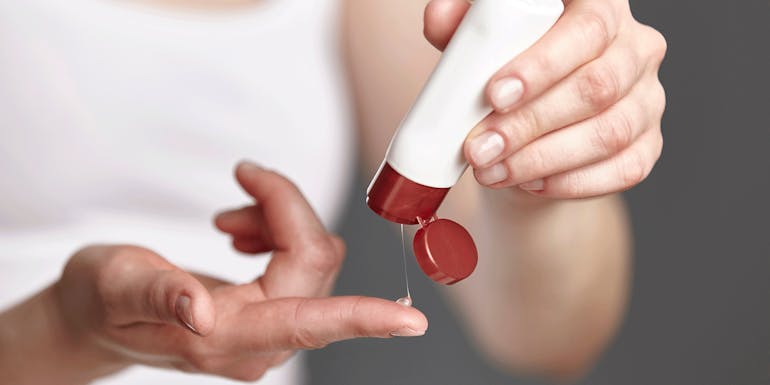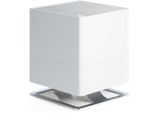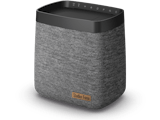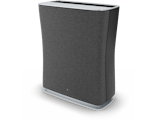
Joana Deplazes, 5 February 2025
Humidify the air
What helps against atopic dermatitis? Effects of humidity and air quality
Dry, itchy skin and unpleasant inflammation – anyone who suffers from atopic dermatitis knows how stressful this skin condition can be. But did you know that the indoor climate in your home has a decisive influence on your skin health? Factors such as excessively dry air or air pollution can significantly worsen the symptoms. The good news is that with the right devices, such as humidifiers, air purifiers and air washers, you can actively take countermeasures and relieve your skin. But why is the indoor climate so important? In this article, you will find out what neurodermitis actually is and how external influences such as air quality can affect the symptoms.
Read on to find out
- What is atopic dermatitis and how does the indoor climate affect the symptoms?
- Skin health and air quality: what helps against atopic dermatitis?
- Humidifiers, air purifiers and air washers for atopic dermatitis: support for dry skin
- Additional care and everyday tips
What is atopic dermatitis and how does the indoor climate affect the symptoms?
The indoor climate plays a key role in symptom control. Dry air in particular, as created by heating systems in winter or air conditioning in summer, draws moisture from the skin. This increases the dryness and intensifies the itching. Low humidity also weakens the already damaged skin barrier and favours the formation of cracks.
Skin health, humidity and air quality: what helps against atopic dermatitis?
A healthy indoor climate that relieves the skin and alleviates symptoms such as dryness and itching helps to combat atopic dermatitis. The right humidity is essential for healthy skin with atopic dermatitis. Humidity that is too low can dry out the skin, which leads to increased itching and cracking of the skin in sufferers of this skin condition. Relative humidity should be between 40–60 % indoors to protect the skin barrier and maintain the skin's moisture balance. You can find out how humidity affects skin care in this blog article.A study has shown that targeted control of indoor humidity has a positive effect on the symptoms of atopic dermatitis. Sufficient humidity strengthens the skin barrier as it prevents the skin from drying out excessively and becoming more susceptible to irritation. Skin health deteriorates significantly in rooms with excessively dry air, which emphasises the importance of a controlled indoor climate.
Humidifiers, air purifiers and air washers for atopic dermatitis: support for dry skin
Humidifiers, air purifiers, and air washers can be helpful for atopic dermatitis, especially for dry skin. Dry air, such as that found in winter months or air-conditioned rooms, irritates the skin and increases itching. Humidifiers increase humidity and protect against dehydration, while air purifiers filter out pollutants and allergens. Air washers combine both functions – they humidify the air and clean it of particles at the same time.Humidifier to help relief atopic dermatitis
By increasing the humidity indoors, humidifiers help the skin with atopic dermatitis to retain moisture. A relative humidity of 40–60 % is considered ideal. This can be monitored using a hygrometer. Optimal humidity helps to reduce dryness and irritation, which often occur with atopic dermatitis. It is important to clean the humidifier regularly to avoid bacteria and germs. The water tank and removable parts should be washed once a week with warm water and mild detergent. Make sure that the appliance is dry before it is used again. The water should also be changed regularly to prevent the growth of microorganisms.
Air purifiers are effective at filtering allergens, particulate matter and pollutants from the air that can trigger atopic dermatitis flare-ups. They help to improve air quality and reduce trigger factors such as pollen, dust mites and air pollution that can promote inflammation and skin irritation.
Air washer to help relief atopic dermatitis
With a combination of air humidification and air purification, air washers offer a dual function for neurodermatitis. They humidify the air and purify it of particles at the same time, which is an ideal solution for improving humidity and air quality.
Additional care and everyday tips
In addition to optimising the indoor climate, there are other measures that can help with neurodermatitis:- Use moisturising creams without fragrances: Moisturising creams help to provide the skin with the necessary moisture and strengthen its barrier function. However, fragrances can cause irritation or allergic reactions, especially on sensitive skin. It is therefore advisable to choose products without fragrances so as not to put additional strain on the skin.
- Reduce contact with allergens and irritating substances: Allergens such as pollen, animal hair or fragrances as well as irritating substances such as certain cleaning agents or chemicals can exacerbate the symptoms of atopic dermatitis. To avoid outbreaks, it is important to minimise contact with these substances by airing the room regularly, using household products without aggressive ingredients and avoiding allergic triggers.
- Maintain a constant room temperature and avoid dry heating air: Extreme temperature fluctuations or dry heating air can dry out the skin and cause irritation. A constant room temperature of around 20 degrees Celsius is ideal to protect the skin.
- Ensure a balanced diet with omega-3 fatty acids: A study showed that the intake of omega-3 fatty acids led to an improvement in the skin condition of atopic dermatitis patients. The fatty acids strengthened the skin barrier and reduced inflammatory processes. These fatty acids are found in foods such as oily fish, nuts and linseed.
Would you like to find out more about how a humidifier can help you feel better or what different humidifier systems are available? You can find more information on our information page about humidifying the air.
More about humidifying the air
If you have questions related to indoor room climate, please get in touch with us. Or subscribe to our newsletter to regularly get informed about current topics regarding indoor climate, experience reports or Stadler Form insights.








